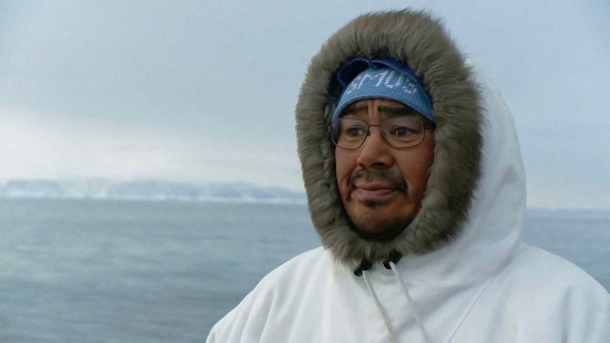
Director/Writer: Matthias von Gunten
Cast: Foini Tulafono, Kaipati Vevea, Vevea Tepou, Lars Jeremiassen, Tukaou Malaki,
Switzerland Documentary 96mins
THULE TUVALU, Matthias von Gunten’s beautifully shot documentary about global warming and two regions united by a gloomily common destiny despite being 20,000km apart, isn’t the aggressive polemic you might have hoped for—but is, perhaps, all the better for it. Because while this could in fact be a significantly angrier piece about the consequences of rising temperatures and sea levels, the inevitably anxious summarising text with which the film is bound to end would be just as speculative and, apparently, helpless. This Swiss-funded film screened this week as part of the 67th Locarno Film Festival’s Panorama Suisse section.
What THULE TUVALU does do well is give a sense of what it might be like to live in either of its two eponymous places. Dividing his time equally between the inhabitants of Thule, Greenland, and those of Tuvalu in the middle of the Pacific Ocean, von Gunten accumulates two absorbing pictures of daily life, highlighting cultural similarities between the people residing in these appreciably contrasting paradises. In a strong opening, Thule resident Lars, 65, shoots a seal from afar—and many other early scenes unfussily depict hunting as a way of life. For Thule and Tuvalu inhabitants alike, animals function merely as transport, food and clothing.
Tuvalu’s temperatures facilitate more intimate means of catching food: Patrick, 42, casts a fishing net as he runs into the sea. On Namunea, the outermost island from Funafuti on Tuvalu’s mainland, we first meet 71-year-old Vevea—who incidentally has six wives and 21 children—as he cuts a pig’s throat. It’s through one of Vevea’s 21 children, 42-year-old Kaipati, that we first hear the C-words: as we learn, climate change is affecting life on Tuvalu in both short- and long-term ways, in the form of droughts and dying vegetation on the one hand and the likelihood that it could be the first country to be entirely submerged by the sea on the other. In a 2009 conference in Copenhagen, we’re told, the UN proposed to limit global warming to two degrees—a tokenistic proposition with which Tuvalu was pressured by industrialised nations into agreeing despite it more or less securing the island’s “certain demise”.
In Thule, meanwhile, the ice is melting and the winters are shortening, meaning its inhabitants are less and less able to hunt for the required amount of time each year to sustain themselves. Tuvalu’s yellowing trees are matched on Thule by an ominously unprecedented rift across a plain of ice. Such warning signs of a possibly irrevocable situation are resulting, understandably, in a great deal of uncertainty for the natives. Briefly, von Gunten travels to New Zealand to catch up with Tuvalu-born Foini, who jumped ship, so to speak, before it was too late. Not everyone can afford this option, of course—presuming they would also emigrate if able to—while others are displaced against their will. Back home, Takuaou makes a dress out of videotape for her daughter’s school performance to celebrate the region’s Day of Friendship; the ceremony took place, we’re told, on the same day a smaller island announced plans for the wholesale resettlement of its population.
For a documentary whose overriding message forbids humour, by the very virtue of spending time with these people, THULE TUVALU has many amusing and/or uplifting moments going for it. The abovementioned Day of Friendship performance is a particular highlight, while the several scenes on Thule featuring dogs are funny almost by default—as when one falls into some water, or when a puppy is distracted from the slab of raw meat with which it would much rather be left alone.
Assisted by Pierre Mennel’s often gorgeous cinematography, such scenes capture the vivid mix of Thule’s dark grey and deep pink skies as well as the serene qualities of overall life there. In a near-transcendent moment, however, the scene that unexpectedly steals the show here is that in which a narwhale is killed with several sniper shots, which dramatically punctuate the surreally quiet air—a profoundly sad encounter that touches on the sublime. MICHAEL PATTISON
LOCARNO INTERNATIONAL FILM FESTIVAL RUNS FROM 6-16 AUGUST 2014